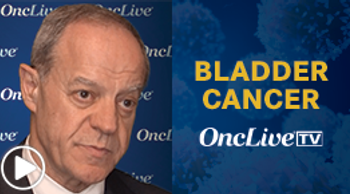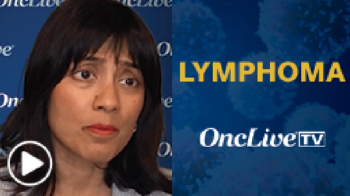
Paolo Tarantino, MD, discusses updated data from the phase 3 DESTINY-Breast03 trial of trastuzumab deruxtecan in HER2-positive breast cancer.

Your AI-Trained Oncology Knowledge Connection!


Paolo Tarantino, MD, discusses updated data from the phase 3 DESTINY-Breast03 trial of trastuzumab deruxtecan in HER2-positive breast cancer.

Emavusertib monotherapy was tolerable and produced responses in patients with FLT3-mutant relapsed/refractory acute myeloid leukemia.

Dana-Farber Cancer Institute investigators have found that people experience discrimination in different ways and in various realms of cancer care.

Joaquim Bellmunt, MD, PhD, discusses the predictive value of H3K27ac epigenomic and single-cell transcriptional profiling in urothelial cancer.

Lakshmi Nayak, MD, discusses the investigation of axi-cel in patients with relapsed/refractory primary and secondary CNS lymphoma.

Axi-cel administration was safe and clinically active in relapsed/refractory primary and secondary central nervous system lymphoma.

Brittany Bychkovsky, MD, MSc, discusses the role of genetic testing in breast cancer care and explores approaches to improving the testing process.

Most young breast cancer survivors can go on to have children despite the effects of their lifesaving treatment, a new study shows.

Ana Christina Garrido-Castro, MD, on sacituzumab govitecan with/without pembrolizumab in metastatic hormone receptor–positive, HER2-negative breast cancer.

Bradley McGregor, MD, discusses the investigation of sacituzumab govitecan plus enfortumab vedotin in metastatic urothelial cancer.

Bradley McGregor, MD, discusses the DAD-IO trial of sacituzumab govitecan, enfortumab vedotin, and pembrolizumab in metastatic urothelial cancer.

Haeseong Park, MD, MPH, discusses the rationale for combining epacadostat with preoperative chemoradiation in locally advanced rectal cancer.

Janet Abrahm, MD, FACP, FAAHPM, reviews the standing of the role of integrative therapies in cancer care.

Joyce F. Liu, MD, MPH, provides insights on WEE1 which has emerged as a potentially targetable pathway in high-grade serous ovarian cancer.

Patrick Ott, MD, PhD, discusses the investigation of cancer vaccines, highlighting the clinical implications of this treatment modality in melanoma.

Eliezer Van Allen, MD, discusses immuno-oncology in relation to precision cancer medicine.

Haeseong Park, MD, MPH, discusses findings from a phase 1 study of epacadostat with preoperative chemoradiation in locally advanced rectal cancer.

Rebecca Porter, MD, PhD, discusses mirvetuximab soravtansine plus pembrolizumab in serous endometrial cancer and future directions for ADCs in the space.

Joyce F. Liu, MD, MPH, discusses the role of Wee1 in cell cycle regulation and the rationale for targeting this protein in ovarian cancer.

Joaquim Bellmunt, MD, PhD, discusses treatment with enfortumab vedotin plus pembrolizumab in patients with urothelial carcinoma in the community setting.

Following the consensus that the risk-benefit assessments for the proposed indications for cilta-cel and ide-cel were favorable during the March 15, 2024, FDA ODAC meeting, both BCMA-targeted CAR T-cell therapies received approvals moving them up in the treatment paradigm for relapsed or refractory multiple myeloma.

Joaquim Bellmunt, MD, PhD, discusses the impact of enfortumab vedotin plus pembrolizumab on the treatment paradigm in first-line urothelial cancer.

Physician-scientists at Dana-Farber Cancer Institute have received a 5-year, $15 million Program Project Grant from the NCI for research in endometrial cancer

Leland Metheny, MD, discusses how agents such as Iomab-B have potential to shift practice in the hematologic malignancy space.

Treatment with acalabrutinib-based regimens led to long-term benefits in patients with higher-risk CLL, across all lines of therapy.

Leland Metheny, MD, discusses ongoing clinical trials and their implications for the field of hematologic oncology.

Joaquim Bellmunt, MD, PhD, discusses how the FDA approval of enfortumab vedotin plus pembrolizumab impacts the urothelial cancer treatment paradigm.

Kenneth C. Anderson, MD, discusses the recent FDA ODAC decision regarding the use of cilta-cel in relapsed/refractory multiple myeloma.

A survey of cancer survivors found that over a quarter had a physical disability impairing mobility and almost 10% had a disability affecting self-care.

Kenneth C. Anderson, MD, discusses the recent ODAC decisions for ide-cel and cilta-cel, highlighting clinical trial data supporting the indications.